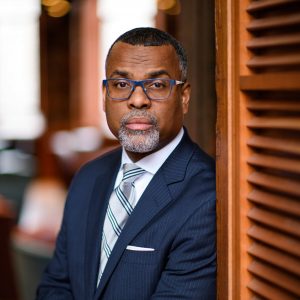SARAH VEST – STAFF WRITER

Time continues to move forward, yet as people have seen time and again, history repeats. Eddie S. Glaude Jr., Week Four’s joint Chautauqua Literary and Scientific Circle and Chautauqua Lecture Series presenter, looks to the past writings of James Baldwin as a way to address the current political climate in the United States to close the theme of “Many Americas: Navigating Our Divides.”
He will be speaking at 10:30 a.m. Thursday, July 22 in the Amphitheater. There will also be a CLSC Special Week Four Program, with Glaude, at 4 p.m. today on the CHQ Assembly Video Platform, bringing together both CLSC picks into a broader conversation.
Glaude is the James S. McDonnell Distinguished University Professor and Chair of the Department of African American Studies at Princeton University. He holds a master’s degree in African American studies from Temple University and a doctorate in religion from Princeton. His books include Democracy in Black: How Race Still Enslaves the American Soul and In a Shade of Blue: Pragmatism and the Politics of Black America.
His most recent, Begin Again: James Baldwin’s America and Its Urgent Lessons for Our Own is a New York Times bestseller and one of Week Four’s CLSC selections.
Glaude said he was initially afraid of reading James Baldwin’s work, but once he started, he was unable to stop. He was drawn to Baldwin because of the power of his writing and the sense that he was “demanding something of (Glaude)” as a reader.
“When you read (Baldwin’s work), there’s the sense that he forces you back on yourself,” Glaude explained.
In his book Begin Again, and in his morning lecture, Glaude wants to think about Baldwin in relation to the current moment in the United States. He feels that Baldwin’s writings can help people think about the contradiction of race in the country and the ongoing betrayal of America’s ideals. He wants to do this by giving a close reading of some of Baldwin’s works before moving into how they relate to the current political climate.
“(Glaude) argued that we had this opportunity after the Civil War during the Walker Social Era, and we thwarted this opportunity because of Jim Crow coming in. We had another opportunity after the civil rights movement that went down the drain in the ‘80s with the ascendance of Ronald Regan as President,” said Sony Ton-Aime, Michael I. Rudell Director of Literary Arts. “Now he’s finally arguing that now we have this opportunity where everything is laid bare in front of us. If we see the things that Baldwin was arguing for, … we can achieve this idea to begin again.”
No Name in the Street was published by Baldwin in 1972 Baldwin published after the assassination of Martin Luther King Jr. This piece struck Glaude as one that he needed to be in conversation with because it is “pained.” According to Glaude, the book is saturated with trauma and is about Baldwin trying to make sense of the pace of history.
“I was trying to figure out how to pick up the pieces after Trump’s election. Like ‘Look, this country has done this again,’ ” Glaude said.
He was working through many of the same thought processes that Baldwin had been working through almost 45 years prior, and No Name in the Street was able to help him with this. In a number of ways, Begin Again deals with history repeating, and Glaude thinks the U.S. is at a moment where the cycle can be broken.
“It all depends on us. We see it now, right now, and where we were in the middle of last summer, all the protests in the streets. Folks are demanding fundamental transformation — not only in terms of policing, but in terms of the stories we tell ourselves about who we are as Americans,” Glaude said. “You see us really kind of doubling down on our ugliness in the face of the demand for change, the kind of insistence on our innocence in the face of the demand for change.”
Glaude thinks that the kinds of changes that need to happen are possible, but that Americans have to accept who they are, all the ugliness included, before that can happen. This can occur only if “something about this country dies,” and the old ghosts of history can be laid to rest. Glaude doesn’t deny that this will be hard work, but it is work that is essential to the survival of the country.
“We have to confront this idea that white people should be valued more,” Glaude said. “We have to confront that idea and conclude that it’s not redeemable. There’s nothing redeemable about the idea that some people, because of the color of their skin, are to be bound with others; but that doesn’t mean we’re irredeemable.”
Despite the book painting a bleak picture of current and past race relations, Glaude thinks that if Americans can figure out how to work toward a better America, together, there is the possibility for a better and brighter future.
“I end on a hopeful note, not an optimistic note, there is a distinction I feel,” Glaude said. “… My hope is in us. To paraphrase a formulation from Baldwin: ‘Human beings are miracles and disasters. We have to protect ourselves from the disasters that we become. But if we show up, if we risk everything — in that moment, there’s a possibility for a miracle.’ ”




